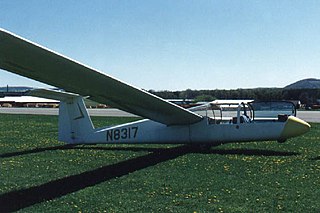
The Yokosuka MXY-7Ohka was a purpose-built, rocket-powered human-guided kamikaze attack aircraft employed by Japan against Allied ships towards the end of the Pacific War during World War II. Although extremely fast, the very short range of the Ohka meant that it had to be carried into action as a parasite aircraft by a much larger bomber, which was itself vulnerable to carrier-borne fighters. In action during the Battle of Okinawa in 1945, Ohkas were able to sink or damage some escort vessels and transport ships but no major warships were ever hit. Improved versions which attempted to overcome the aircraft's shortcomings were developed too late to be deployed. Allied troops referred to the aircraft as "Baka Bombs".

The Mitsubishi J8M Shūsui was a Japanese World War II rocket-powered interceptor aircraft closely based on the German Messerschmitt Me 163 Komet. Built as a joint project for both the Navy and the Army Air Services, it was designated J8M (Navy) and Ki-200 (Army).

The Yokosuka MXY8 Akigusa was a training glider built in parallel with the Mitsubishi J8M rocket-powered interceptor aircraft.
The Yokosuka MXY9 Shuka was a projected development of the MXY8 training glider, adding a small motorjet engine, the Tsu-11. It was intended to provide further training for pilots who were to fly the Mitsubishi J8M and Ki-200 rocket-powered interceptor aircraft.

Yokosuka Naval Air Technical Arsenal had many names, each depending on the period of its existence, and the circumstances at that time. Many of the names were acronyms that were derived from its military name or designation, which changed from time to time. The arsenal was sometimes known as "Kūgi-shō". The name Yokosuka prevailed however, even though it referred to the Arsenal's location at Yokosuka, Japan.

The Slingsby T.53 was the first all-metal sailplane designed and built in the United Kingdom. It was designed and built by Slingsby Sailplanes for evaluation by the Royal Air Force.
The Moore Gypsy or Birmingham Guild BG 100/12 and BG 135 is an early all-metal, single seat, sailplane designed in the UK in the late 1960s. Several longer span variants were produced by various manufacturers. The first BG 135 was still flying in 2011.
This page is based on this
Wikipedia article Text is available under the
CC BY-SA 4.0 license; additional terms may apply.
Images, videos and audio are available under their respective licenses.




